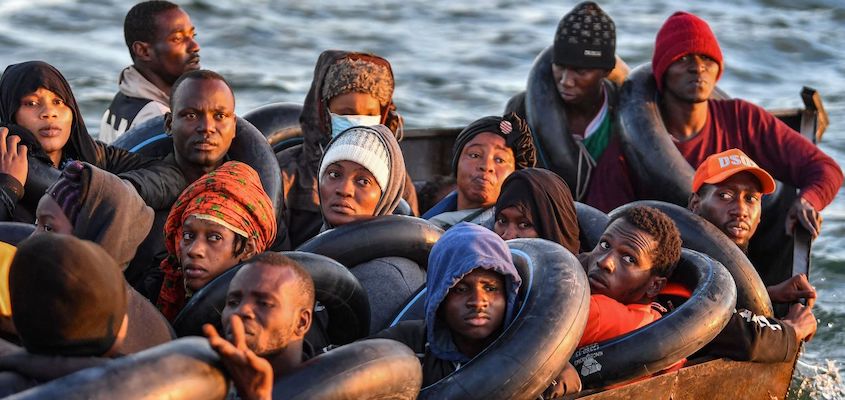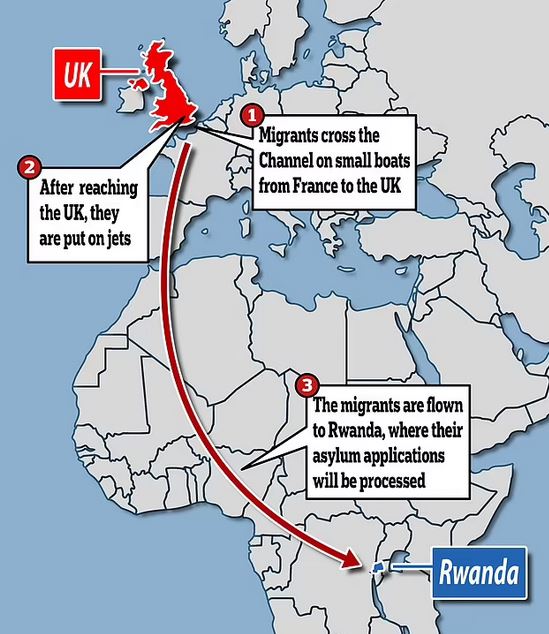
- While the UK-Rwanda Asylum Plan claims compliance with the Refugee Convention, the lack of detailed information on detention, procedural safeguards, and fair treatment raises concerns.
- The implementation of this agreement puts pressure on continental law enforcement and asylum systems, potentially straining relations with the European Union.
- As countries consider such approaches, they risk neglecting long-term investments in political, development, and humanitarian efforts essential for stabilizing an already strained refugee regime amidst unprecedented displacement.
The recent UK-Rwanda agreement has sparked debates and concerns over its impact on the traditional principles of asylum. This controversial deal goes beyond typical offshore processing, proposing a permanent relocation of certain asylum seekers to Rwanda, symbolizing a broader trend in externalizing migration management. This move challenges the established post-World War II protection system, notably the principle of territorial asylum, by suggesting that states can pay to transfer their responsibilities under the 1951 Geneva Convention. The UK government’s commitment to pay Rwanda £120 million for economic development raises questions about the transactional nature of protection obligations.
While framed as a tool to deter irregular entries, the success of the UK-Rwanda program hinges on overcoming significant obstacles. International law binds the UK, necessitating protection for specific groups of asylum seekers. Identifying cases, such as unaccompanied children or those with family ties in the UK, becomes a complex screening process, opening the door to legal challenges. The reliance on double voluntarism—both the UK and Rwanda agreeing to each relocation—further complicates the scheme. The flexibility in the agreement allows for selective acceptance, with Rwanda expressing reservations about relocating citizens of neighbouring countries or those with criminal records.
Even if the UK manages to relocate asylum seekers to Rwanda, the actual impact on irregular arrivals remains uncertain. Similar deterrence-focused policies in the Americas and Australia have shown limited success, often diverting migrants to more dangerous routes or underground channels.
Beyond Britain, the implementation of this agreement puts pressure on continental law enforcement and asylum systems, potentially straining relations with the European Union. Additionally, it signals to other countries, like Denmark, that similar arrangements are plausible, reigniting interest in externalization programs.
UK Supreme Court Rejects Controversial Asylum-Seeker Plan with Rwanda
In a significant blow to the British government, the UK Supreme Court has unanimously ruled against a contentious immigration policy. The plan, spearheaded by Prime Minister Rishi Sunak, intended to send asylum-seekers to Rwanda for processing, has been deemed unlawful.
The court’s decision stems from concerns that asylum seekers might face a real risk of ill-treatment if sent back to their countries of origin after being removed to Rwanda. The ruling challenges the government’s approach to deter migration by threatening deportation to Rwanda, highlighting potential violations of human rights and refugee protection.
Following the court’s decision, Prime Minister Sunak expressed his intent to pass emergency legislation designating Rwanda as a safe country. He emphasized that foreign courts would not impede the UK’s plan to transfer migrants to Rwanda. Notably, the European Court of Human Rights had already blocked a planned flight to Rwanda in June 2022. The British government, grappling with a surge in migrants crossing the English Channel, had advocated for the Rwanda policy as a deterrent. However, critics argue that there is insufficient evidence to support the effectiveness of such measures.
This legal setback not only challenges the government’s immigration strategy but also raises questions about the future of the Rwanda policy. With the government having already paid Rwanda almost $175 million for the plan, the ruling leaves the policy in a precarious position. The Supreme Court’s ruling underscores the importance of adherence to national laws and international treaties, emphasizing the need to protect the rights of refugees. The decision has sparked discussions about the potential ramifications for the UK’s immigration policies and its relationship with international human rights conventions.
Refugee charities, including the Refugee Council, have welcomed the ruling, considering it a victory for the rights of asylum-seekers. The legal battle over the Rwanda policy adds to the challenges facing the Sunak government, which is already navigating a complex landscape of immigration issues. As the UK Supreme Court decision reverberates, questions emerge about the government’s next steps and the broader implications for asylum-seeker policies in the United Kingdom.

Rwanda’s Gains from the Deal
Rwanda, led by President Paul Kagame, faced shifting perceptions since its remarkable recovery from the 1994 genocide. Initially receiving Western support, Rwanda’s one-party state status and uneven economic distribution garnered criticism. In response, Rwanda focused on multilateral institutions, positioning itself as a stabilizing force in Africa.
The Mozambique intervention showcased Rwanda’s regional stability role, enhancing its international standing. Now, with the UK-Rwanda refugee deal, Rwanda strategically aligns itself with Western priorities, emphasizing its ability to play a constructive role. Benefits for Rwanda include:
1. Diplomatic Influence: By engaging in deals like the UK-Rwanda agreement, Rwanda enhances its diplomatic standing. It positions itself as a valuable ally in addressing global challenges, garnering influence on international platforms.
2. Regional Stability: Participation in peace missions, like the Mozambique intervention, solidifies Rwanda’s role in maintaining regional stability. This fosters relationships with Western nations seeking partners in conflict resolution.
3. Economic Opportunities: The UK’s financial commitment to the refugee deal provides economic support for Rwanda. This includes the GBP 120 million for economic development and growth, contributing to the country’s financial stability.
4. International Partnerships: Rwanda’s collaboration with Western nations, especially the UK, strengthens international partnerships. These connections open avenues for trade, development, and cooperation, further benefiting Rwanda’s interests.
In essence, Rwanda strategically positions itself as a valuable player on the global stage, leveraging diplomatic manoeuvres to reinforce its regional stability role and secure economic advantages.
Possible Drawbacks for Rwanda
1. International Scrutiny: Rwanda’s involvement in the UK deal could subject it to heightened international scrutiny. Critics may question the country’s human rights record and governance practices, potentially affecting its global image.
2. Deterioration of Territorial Asylum Principle: The agreement challenges the principle of territorial asylum, as asylum seekers are relocated to Rwanda rather than accessing the UK asylum process upon arrival. This may lead to concerns about human rights and refugee protection within Rwanda.
3. Domestic Opposition: The deal might face resistance domestically, with segments of the Rwandan population or political groups expressing discontent over the agreement. Opposition could emerge if citizens perceive negative consequences or if the relocation process encounters difficulties.
4. Refugee Integration Challenges: Rwanda may encounter challenges in effectively integrating relocated asylum seekers into its society. Addressing linguistic, cultural, and economic differences can pose hurdles, impacting social cohesion and potentially leading to tensions.
5. Economic Dependency: While the financial support from the UK contributes to economic development, Rwanda’s reliance on external funds raises concerns about long-term economic sustainability. External economic dependencies may limit Rwanda’s autonomy in decision-making.
6. Potential for Socioeconomic Inequality: The economic benefits of the deal might not be uniformly distributed among Rwandans, potentially exacerbating existing socioeconomic disparities. Ensuring equitable distribution of resources becomes crucial to prevent internal tensions.
7. Regional Relations: The agreement’s impact on Rwanda’s relations with neighbouring countries or regional bodies should be monitored. Depending on perceptions and responses, it could influence regional dynamics and partnerships.
In conclusion, the UK-Rwanda agreement poses challenges to the established norms of asylum and protection. While claiming compliance with the Refugee Convention, the lack of detailed information on detention, procedural safeguards, and fair treatment raises concerns. As countries consider such approaches, they risk neglecting long-term investments in political, development, and humanitarian efforts essential for stabilizing an already strained refugee regime amidst unprecedented displacement.
(Aayush is a post-graduate student in International Relations at Kalinga University, Raipur.)
Aayush Pal is a freelance writer on contemporary geopolitical developments. The views expressed in his work are entirely his own.
